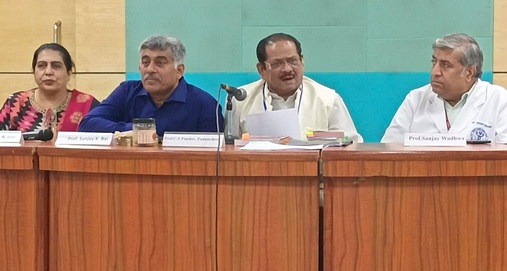
Eat millet-based food to stay healthy: AIIMS doctors
Delhi-AIIMS doctors gave a push to promote the intake of millet-based food items which can prevent and manage multiple NCDs including, diabetes, cancer, celiac diseases, carcinoma of colon, obesity, anaemia and hypercholesterolemia.
It may be noted that militias have been given special focus by the government, after the United Nations (UN) General Assembly at its 75th session declared 2023 the International Year of Millets (IYM2023).
Prof Sanjay Wadhava, Head, PMR, Delhi-AIIMS, said that millets contain fibre which helps in digestion, and controls the cholesterol level and weight.
"Millet intake helps in controlling the level of sugar and it reduces the risk of heart diseases. For people, who have gluten sensitivity, a protein found in wheat, barley and rye, that at times cause severe adverse reactions including, boating and severe loose motions, millets can be helpful to help them ease their problems," Dr Wadhwa said.
Padmashree and Ex-Head of the Department of Community Medicine, Prof Chandrakant Pandav, said that millet intake controls and prevents many conditions including, diabetes, obesity, malnutrition, cancers, arthritis and osteoporosis. It is also helpful for gut health.
"The biggest advantage of cultivating millets is that it is highly drought resistant. Millets are very hardy crops, it takes less water and it is very resilient. It is very cheap compared to staple cereals, including rice. It has 500 recipes. After switching to a millet-based diet, I have lost six kilos," Prof Pandav added.
Ms Pamrit Kaur, Chief Dietician at Delhi-AIIMS, said that after the age of six months, anyone can be given millet-based food. Millet dishes can be made by roasting and soaking. After that one can keep making its powder and keep it stored in an airtight container under refrigerated conditions for two months. One can mix it with water or milk and use it as a weaning food for the child. It is rich in minerals and vitamins but its cooking and preparing methods are crucial. It must be roasted so that it loses some of its anti-nutrients. Similarly, it should be soaked for twelve hours.
Prof Sanjay Rai from the Department of Community Medicine, Delhi-AIIMS, said that as per research it helps in preventing colon cancer as it captains a substantial amount of fibre. It is proven.
"It helps in preventing diabetes and helps to manage diabetes by controlling the sudden rises in sugar levels. There are many research studies to validate these claims," he emphasised.
Prof Rai added that millets have played a major role in India's diet. It has been a trend for thousands of years. Millets diets were a group of all strata of society. All affluent and poor could diet them. But after some time people started to not eat. But today it is reviving.
"Millets play pivotal roles for patients who have gluten sensitivity and celiac diseases. Patients of celiac disease can keep taking millet-based food without worrying about any adverse reactions," he added.